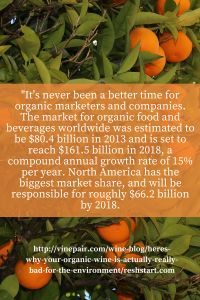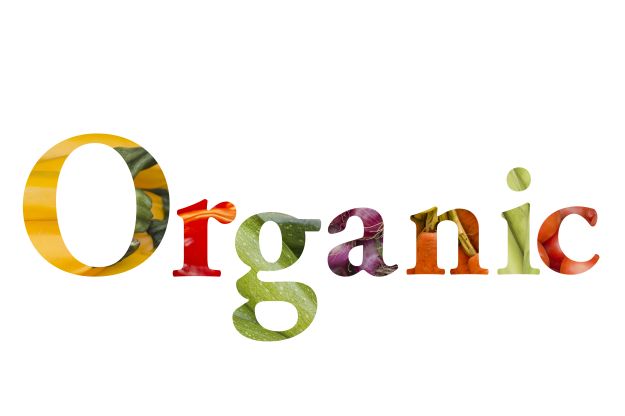I’m an avid supporter of the organic movement from a wholesome health and environmental point of view. But I do think that organic wine is a joke.
I love the concept of being able to buy organic food from the supermarket. If I want to avoid unnecessary chemicals in my food, and I can’t grow them, then I can choose to do so. If I choose to pay a little more money for food in an attempt to better manage my health, then I can choose to do so.
And I believe that introducing less unnatural chemicals into the environment is a very good thing.
I have come to trust the organizations responsible for delivering that chemical free food into my pantry. This is because otherwise, I have no idea how it has been grown. Otherwise there is no visibility of the processing, packaging and transportation. And I trust that the organic products have been grown and processed free from the pesticides and fertilizers that I would otherwise have no control over.
I want to take this opportunity to say a sincere thank you to those primary producers, and reputable organizations who deliver me that trust.
Organic Wine is Joke
A bit harsh, you think? What about an oxymoron, then.
Google oxymoron and see it is defined as:
“a figure of speech in which apparently contradictory terms appear in conjunction”
You’ll see what I mean in a minute.
Sometimes I feel that there is a whole spin-off market and trusting band of followers who assume that everything produced under a certain label, can be trusted without too much further question. And I think organic wine is being falsely marketed under the organic label in order to garner sales from the trusted band of followers. Just because it is labeled as organic, there may be some consumers who believe that the product is somehow safer, or even safe, to drink. Indeed I understand that the product may satisfy the government or industry criteria of being organic. In actual fact, organic wine fails the criteria. Big time.
Organic Wine Fails Any Criteria to be Organic
My problem is with alcohol content. No matter how chemically free the grapes were produced, or how little insecticide was sprayed on the vines, the problem lies not from the grape growing practices, but within the wine production process.
Alcohol is a toxic, poisonous chemical, and we need to understand that alcohol is doing us harm when we drink it. Alcohol and its by-products in the body have been identified as Class 1 carcinogens by the IARC, the International Agency for Research on Cancer. There can no longer be any confusion about the fact that alcohol is harmful to humans, and the long term consumption of alcohol can kill. Or a short and intense binge of alcohol can kill quickly if the drinker gets their Blood Alcohol Content above the fatal limit.
How Can Wine be Labeled as Organic?
Fundamentally I agree with the benefits of organic production of table grapes. There can be nothing more nourishing than munching on some beautiful fresh grapes as a healthy snack. It’s even better if those grapes have been grown organically and free from harmful chemicals. Great for the environment, too.
The oxymoron is that alcohol comes from the fermentation process from turning grapes into wine. Even though one could argue that alcohol is formed naturally by the organic transformation of fruit sugars into alcohol, the end product is a toxic and poisonous chemical that can cause great harm. The end result is Ethanol. Ethyl Alcohol. Alcohol. Yes, the same substance as Ethanol fuel, the biofuel additive for gasoline.
Is that not just a tad misleading?
Alcohol is a Mind Altering Drug
There is a problem with alcohol. Even though it is a naturally occurring chemical, it just so happens to trigger the pleasure response cells in our brain. Our emotions, moods, pleasure and behaviors are regulated by the natural production of hormones. The natural chemical that is stimulated by pleasure in the brain is called dopamine. And our brains love dopamine. Really love it.
What we need to understand is that alcohol messes with the dopamine levels in the brain. It triggers an unnaturally high level of dopamine to flood the brain. This can result in a chain reaction, whereby the brain releases more dopamine, which in turn creates demand for more alcohol.
Alcohol can become a vicious cycle. And don’t we know it.
So the question I really want to pose is for those who choose to drink organic wine. Does it really contribute to a healthy diet? Even though it contains no nasty insecticides, it can actually result in a chemical imbalance in the brain, which can cause addictive behaviors, and an increased risk of cancer. Not to mention all the other possible harmful side effects of accidents and antisocial behavior and personal harm.
False Labeling has Happened in Other Food Classifications
Here’s an example of this. The Glycaemic Index (GI) is allocated to foods as an indication which foods were more highly processed. This set them apart from other foods which may take longer to digest, and therefore be more healthy for us. I used to trust the GI rating as an excellent guide to avoiding overly processed food. That was until the manufacturer of raw sugar managed to convince the GI rating governance that raw sugar somehow deserved a favorable rating by comparison to white sugar. I understand the difference between the level of processing between these two sugar products, but do we really think that raw sugar takes longer to digest than white sugar, and do we really believe that raw sugar is better for us than white sugar? Both products contain the same amount of sugar!
I don’t like to be opinionated and outspoken, but this is ridiculous!
Is the general public being slightly misled, or not?
Cashing in on the Lucrative Organic Market
Forgive me the offense directed at those who go to great expense to produce organic foods.
I would love to eat fully organic food. It’s my dream to see a world where no dangerous chemicals make their way into our bodies, our wildlife, our waterways and the soil. Air, forests, oceans…
Balance that dream with the knowledge that the organic movement is enormous. Know that savvy marketers will pull out all stops to get their share of the billions on offer.

http://vinepair.com/wine-blog/heres-why-your-organic-wine-is-actually-really-bad-for-the-environment/
The organic movement is a multi million dollar industry, and with great power comes great responsibility. How many millions of dollars is that, exactly? And sorry to those who go out of their way to choose organic wine. Organic wine is not good for you because it is labeled as chemical free. Before we blindly trust the labels on our food, we need to stop and thing. We really need to understand whether it contributes to a healthy, organic diet.
Is anyone really thinking about this?
Organic wine is one of the most ridiculous things I’ve ever heard of!
A 2015 Guardian.com headline in Australia stated: “Less powerful hangovers, fewer chemicals, and kinder to the environment – no wonder organic wine is booming in Australia” (Read the article here). Evidently the reduced amount of Sulphites in the wine (which is one of the requirements to qualify as organic) reduces the headaches and hangover the next day for some people.
I imagine that implies that fewer people will feel sorrowful about drinking too much and continue to drink unabated. They will continue to consume a poisonous, Class 1 carcinogen on an ongoing basis, with little pause for reflection.
Does anyone else think this is wrong?
I hope some of the thoughts in this article trigger a thought process about what we purchase and consume. Let’s consider what we choose to believe from our food labeling. And most of all, consider the marketing surrounding alcohol and organic wine.





What a revelation! I never thought about it this way before – but it is so true.
Alcohol is a nasty chemical that I no longer need to have. Keep up the good work!
Thanks for your comment, Annabelle. We really appreciate your feedback and sentiment. Sonya xo